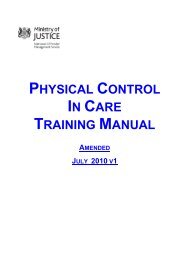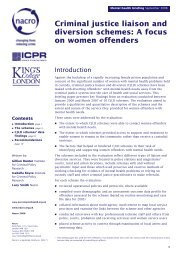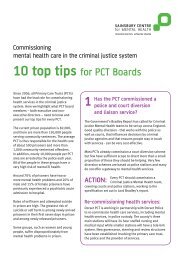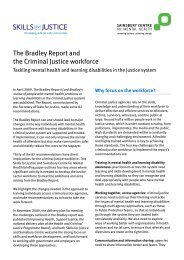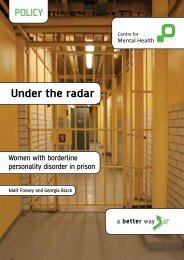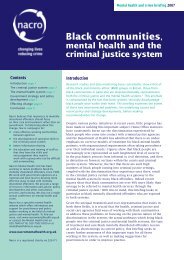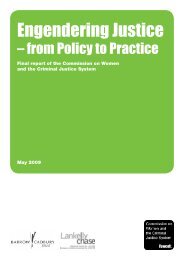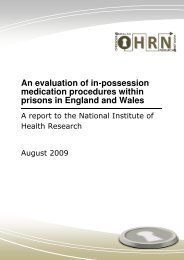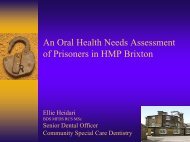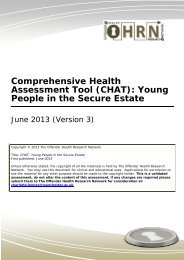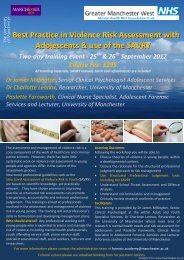Procedures for Prison Research with Health Outcomes
Procedures for Prison Research with Health Outcomes
Procedures for Prison Research with Health Outcomes
Create successful ePaper yourself
Turn your PDF publications into a flip-book with our unique Google optimized e-Paper software.
) Is the project ‘research’, ‘audit’ or ‘service evaluation’? Only‘research’ requires approval by NHS REC (Section 2) andGovernance (Section 3), though all three require HMPS approval(Section 4) if undertaken by staff external to HM <strong>Prison</strong> Service.See Annexe 1 <strong>for</strong> NRES’s definitions, <strong>with</strong> examples specific toprison, noting occasions when ethical review would be advisable <strong>for</strong>audit and service evaluation.c) Does the project fulfil NOMS criteria? National OffenderManagement Service (NOMS) comprises all correctional services inEngland and Wales. An application <strong>for</strong> approval by the ProjectQuality Assurance Board (PQAB) will be required if the researchproject fulfils the criteria in Box 1.Box 1: Criteria <strong>for</strong> PQAB Application• national in scope• intended to be published• results to be sent to Ministers• a study of outcomes of policy or operationalchangesNB: Applications <strong>for</strong> NHS REC Approval, Governance Approvaland HMPS Approval may be made concurrently, but bothGovernance and HMPS Approval will be subject to obtainingNHS REC Approval.
3: NHS REC ApprovalApproval is required from an NHS <strong>Research</strong> Ethics Committee (REC)<strong>for</strong> health research in prisons. The Chair or Vice-Chair of a REC candecide whether or not a project requires REC approval (see Annexe3 <strong>for</strong> details), alternatively email the NRES queries line(queries@nationalres.org.uk). Further in<strong>for</strong>mation on this processis available from the National <strong>Research</strong> Ethics Service:http://www.nres.npsa.nhs.uk/applicants/index.htm.The application <strong>for</strong>m <strong>for</strong> ethical approval by NHS REC can be foundfrom the NRES website, or by visiting www.nres<strong>for</strong>m.org.uk. Thereis advice <strong>for</strong> applicants on the NRES site, but the following is prisonspecificadvice.Guidance <strong>for</strong> Applicationo Access www.nres<strong>for</strong>m.org.uko Register/Log ino Complete <strong>for</strong>m using Question Specific Advice (available using‘Help’)o NB In the initial ‘<strong>for</strong>m sieve’, there is a specific questionon whether the research will involve prisoners. You arerequired to state whether the research will be carriedout only at <strong>Prison</strong> Service Establishments or a mix ofprisons and NHS Care Organisations.o A new question has been added to the ‘<strong>for</strong>m sieve’asking whether any participants will be included whocannot consent <strong>for</strong> themselves. This has beenintroduced to comply <strong>with</strong> the Mental Capacity Act2005. If this is applicable, a pop-up screen offersadditional guidance notes.
o If the research will only take place in <strong>Prison</strong> ServiceEstablishments, details of the proposed sites should beentered in Section 6. If it is a mix, the relevant part ofSection 1 must also be answered.o There is no longer a need to have signed Governor’sApproval in Principle at this stage. Instead, the <strong>for</strong>mrequests a list of the name and type of prison serviceestablishments expected to be included. Inclusion ofthese sites is then subject to approval from the localPCT (see Section 4 below).o The Site Specific In<strong>for</strong>mation Form is populated fromthe answers given in the NRES <strong>for</strong>m, and one should becreated <strong>for</strong> each research site. This may be required byNHS Governance (see section 4), but does not need tobe submitted <strong>with</strong> the application to NHS REC.o Advice: See Annex 4 <strong>for</strong> Advice on <strong>Prison</strong> Service<strong>Research</strong>, compiled by Jane Martin of South East REC.o Ensure documentation is compete and <strong>for</strong>m signedo Ring Central Allocation System <strong>for</strong> allocation to a REC whichconsiders prison researcho Advice: Ensure a member of the research team (preferablythe Chief Investigator) can attend the REC meetingo Lock <strong>for</strong>mo Advice: Photocopy entire submission, including supportingdocumentation – you may need to send it to othercommitteeso Send to RECo Contact REC co-ordinator to see if attendance isrequired/encouraged
o Advice: Attend if at all possible – some issues may be easilysolved in person which would otherwise take extensivecorrespondenceo REC Meetingo Correspondence and REC decision
4: Governance Approval<strong>Research</strong> Governance can be defined as the broad range ofregulations, principles and standards of good practice that exist toachieve, and continuously improve, research quality across allaspects of healthcare in the UK and worldwide. It applies toeveryone connected to healthcare research, whether as a ChiefInvestigator, Care Professional, <strong>Research</strong>er, their employer(s) orsupport staff.R&D Departments at local PCTs will assess research governanceissues, including the need <strong>for</strong> NHS resources from the proposedstudy sites. These will include an assessment of the study designand ascertainment of whether the study includes vulnerable groupsand the impact of this. Further in<strong>for</strong>mation on research governancecan be found in the <strong>Research</strong> Governance Framework at thefollowing link:http://www.dh.gov.uk/PolicyAndGuidance/<strong>Research</strong>AndDevelopment/<strong>Research</strong>AndDevelopmentAZ/<strong>Research</strong>Governance/<strong>Research</strong>GovernanceArticle/fs/en?CONTENT_ID=4002112&chk=PJlaGgPrior to applying <strong>for</strong> governance approval, you may need to discussthe feasibility of the research <strong>with</strong> the R&D Department, relevantprison staff and/or the prison’s <strong>Research</strong> Contact. Contact details<strong>for</strong> <strong>Research</strong> Contacts will be made available on the PHRN websiteonce complete. Final approval will only be given subject to NHSREC approval, but applications may be made at any stage.
Guidance <strong>for</strong> applicationso Check which PCT is each prison located (seehttp://www.dh.gov.uk/assetRoot/04/10/75/10/04107510.pdf)o Access www.rd<strong>for</strong>um.org.uk <strong>for</strong> contact details of R&DDepartment <strong>for</strong> PCTo Ask R&D representative abouto submission requirementso if an additional submission is required to any otherTrusto if an honorary contract is requiredo Submit appropriate documentation to R&D leado In many cases the REC submission is required, and alsoa completed Site Specific In<strong>for</strong>mation (SSI <strong>for</strong>m), foundat the end of the NRES <strong>for</strong>m at www.nres<strong>for</strong>m.org.uko Advice: Where submission to several Trusts is required, keepan updated list of each Trust’s requirements and details ofany contact <strong>with</strong> the Trusto Correspondence and R&D decisiono NB Final approval can only be granted when NHS RECapproval letter has been <strong>for</strong>warded to R&D department butapplication can be made at any timeNB For audit and service evaluation projects, research governanceapproval is not required. However, an application must be made tothe clinical governance department of the PCT. It should bepossible to reach this through the main PCT switchboard.
5: HMPS ApprovalAll prison-based research must be approved by HM <strong>Prison</strong> Service.Investigations coming under the category of ‘Audit’ or ServiceEvaluation’ (See Annexe 1) conducted by staff external to HM<strong>Prison</strong> Service must still be approval by the following procedure.o Advice: Application process will be faster if already approvedby NHS REC, but may be made at any time.o Access www.hmprisonservice.gov.uk and go to ‘ResourceCentre’, ‘<strong>Research</strong>’.o Complete ‘<strong>Research</strong> Application Form’, ie PSO 7035o Submit to:o <strong>Research</strong> contact if project to take place at oneestablishmento Area Psychologist if project to take place at severalestablishments in one <strong>Prison</strong> Service Areao Planning Group if project to take place at severalestablishments in more than one <strong>Prison</strong> Service Areao Correspondence and DecisionNB NOMS procedures state that offenders involved in research arenot to be given incentives <strong>for</strong> taking part in research if located inprison, and only voucher incentives if located in the community.
6: NOMS ApprovalThe aim of the approval procedure <strong>for</strong> research projects fulfillingNOMS criteria is to help delivery groups manage any risksassociated <strong>with</strong> research. It ensures that:• there is high level delivery/policy input to research planning,resulting in a clear definition of what research is needed andwhat the aims and outputs of that research should be;• research is robust and valid, <strong>with</strong> a high quality design tomaximise the likelihood of achieving the stated aims; and• Ministers are aware of what research is proposed and why,and agree to the research.If the PSO 7035 application (see HMPS Approval above) includeshealth outcomes only, and meet the criteria in Box 1 (see Section2), it should be sent to PQAB <strong>for</strong> in<strong>for</strong>mation only:If the PSO 7035 application also includes NOMS outcomes, <strong>for</strong>example, offender management, reducing re-offending, protect thepublic, etc., and meet the following criteria, an application shouldbe made to PQAB <strong>for</strong> approval.The PQAB application consists of a PQAB <strong>for</strong>m and a ProjectApproval Record (PAR) (See PHRN Website <strong>for</strong> downloads to the<strong>for</strong>ms; www.phrn.nhs.uk/jail). PQAB usually takes 10 working daysto reach a decision. PQAB will contact the project manager directly<strong>with</strong> feedback on the application.
7: University ApprovalUniversity approval may be required <strong>for</strong> external researchers, or <strong>for</strong>those studying <strong>for</strong> higher degrees; check <strong>with</strong> your department, orUniversity Ethics Committee. Approval may be important to ensureindemnity. (For other researchers, check indemnity issues <strong>with</strong>employer.)8: Governor’s ApprovalGovernors have the final say whether research may take place intheir establishments.Governor’s approval.No project may take place <strong>with</strong>out theBEGIN RESEARCH!
ANNEXE 1:RESEARCH, AUDIT OR EVALUATION?RESEARCH CLINICAL AUDIT SERVICEEVALUATIONThe attempt to derive generalisable newknowledge including studies that aim togenerate hypotheses as well as studiesthat aim to test them.Designed and conducted to producein<strong>for</strong>mation to in<strong>for</strong>m delivery of bestcare.Designed and conductedsolely to define or judgecurrent care.Quantitative research – designed to testa hypothesis.Qualitative research –identifies/explores themes followingestablished methodology.Designed to answer the question:“Does this service reach apredetermined standard?”Designed to answer thequestion:“What standard does thisservice achieve?”Addresses clearly defined questions,aims and objectives.Quantitative research -may involveevaluating or comparing interventions,particularly new ones.Qualitative research – usually involvesstudying how interventions andrelationships are experienced.Usually involves collecting data that areadditional to those <strong>for</strong> routine care butmay include data collected routinely.May involve treatments, samples orinvestigations additional to routine care.Measures against a standard.Involves an intervention in use ONLY.(The choice of treatment is that of theclinician and patient according toguidance, professional standardsand/or patient preference.)Usually involves analysis of existingdata but may include administration ofsimple interview or questionnaire.Measures current service<strong>with</strong>out reference to astandard.Involves an interventionin use ONLY. (Thechoice of treatment is thatof the clinician andpatient according toguidance, professionalstandards and/or patientpreference.)Usually involves analysisof existing data but mayinclude administration ofsimple interview orquestionnaire.Quantitative research - study design mayinvolve allocating patients tointervention groups.Qualitative research uses a clearlydefined sampling frameworkunderpinned by conceptual or theoreticaljustifications.No allocation to intervention groups:the health care professional and patienthave chosen intervention be<strong>for</strong>eclinical audit.No allocation tointervention groups: thehealth care professionaland patient have chosenintervention be<strong>for</strong>eservice evaluation.May involve randomisation No randomisation No randomisationALTHOUGH ANY OF THESE THREE MAY RAISE ETHICAL ISSUES, UNDER CURRENT GUIDANCE:-RESEARCH REQUIRES R.E.C.REVIEWAUDIT DOES NOTREQUIRE R.E.C. REVIEWSERVICEEVALUATION DOESNOT REQUIRE R.E.C.REVIEWTaken from NRES definitions at www.nres.npsa.nhs.ukNB Whilst Audit and Service Evaluation are not required to be reviewed by REC,there are occasions when the content of the study means it is advisable <strong>for</strong> RECreview to take place. For example, an audit of rape trauma counselling hasethical implications and should be reviewed. If in doubt, contact the Chair orVice-Chair of a prison-specific REC (see Annexe 3), or alternatively email theNRES queries line (queries@nationalres.org.uk). If there is any risk of harm,then ethical review is probably advisable.
ANNEX 2: DEFINING OFFENDER HEALTHRESEARCHadapted from MRC definition of clinical research by Dr MaryPiperThe term “health research” encompasses a broad range of activitiesall aimed at improving or maintaining human health.The main outcomes from health research is a health outcome <strong>with</strong>the ultimate aim of being able to apply the knowledge gained fromresearch to improve healthcare delivery, which itself may be thesubject of research such as, studies of health services andorganisation.Clinical research: <strong>Research</strong> based on humans and designed toanswer questions about health and disease. In addition to directexamination of individual patients and populations, it includes thestudy of biological samples and personal data deriving from theindividuals concerned.Population sciences: Investigations undertaken to identifymechanisms of health or disease, or to test the validity andimportance of new interventions, or treatments. e.g. descriptiveepidemiology, cohorts, randomised trials, and case-control designsinvolving people<strong>Research</strong> defined as health should encompass at least one of thefollowing categories:1. Human participation: studies <strong>with</strong> a main health outcome thatrequires face-to-face contact <strong>with</strong> patients and/or healthy humanparticipants and may involve use of patient records as well.• Assessment of the impact of an improved clinical substancemisuse service on people in prison2. Records based studies: studies which require access topersonal data on health or lifestyle <strong>with</strong>out involving face-to-facecontact <strong>with</strong> any people e.g., epidemiological studies, healtheconomic studies, public health interventions, health servicesresearch and meta-analyses – in<strong>for</strong>mation may be obtained bytelephone, postal questionnaires/surveys or electronic/manual dataretrieval.• Study of records of those who have died in prison or onrelease from custody, ie suicide.
3. Clinical samples: studies that involve laboratory studies onhuman material which are specifically designed to understand ortreat a disease/disorder.• Examination of urine/blood to ensure that medication is beingtaken appropriately, ie treatment <strong>for</strong> TB, epilepsy, etc.4. Intervention development <strong>for</strong> clinical use: development oradaptation of technologies <strong>for</strong> diagnosis or treatment egdevelopment of new interventions.• Examination of the effectiveness of new interventions inprison or the community: ACCT or Integrated <strong>Prison</strong> DrugTreatment System (IDTS), Cognitive Behavioural Therapy.NB If there is any doubt over whether a research project is ‘healthresearch’, contact the Chair of a <strong>Research</strong> Ethics Committee (SeeAnnexe 3 below) or email NRES’s query line(queries@nationalres.org.uk).
ANNEXE 3: CHAIRS AND COORDINATORS FORRECS CONSIDERING PRISON RESEARCH(correct as of February 2007)<strong>Research</strong> EthicsCommitteeEaling and West London RECNorth Nottinghamshire RECNorthern & Yorkshire MRECSouth East MRECSouth Essex RECSouth Staf<strong>for</strong>dshire RECThames Valley MRECWales MRECChairMr ColinStansfield.Dr DavidWalsh.Prof PeterHeasmanDr JohnLamberty.Dr KarlMetcalfe.Rev PennyGraysmith.Mr PeterTausig.Dr GordonTaylorContactMs Alene Pointon020 8846 7255alene.pointon@hhnt.nhs.ukMs Trish Wheat0115 912 3344trish.wheat@rushcliffe-pct.nhs.ukMr Bill Hackett0191 5699515bill.hackett@suntpct.nhs.ukMrs Jane Martin01227 831662jane-martin@stmrec.fsnet.co.ukMs Suzanne Emerton01279 419312suzanne.emerton@eoe.nhs.ukMrs Sandra Halden01785 221119sandra.halden@sasha.nhs.ukMiss Anna Howitt0118 918 0556anna.howitt@berkshire.nhs.ukDr Corinne Scott029 2037 6829.mrec@bsc.wales.nhs.uk
ANNEX 4: COMMON THEMES/ISSUES FROMREVIEWS OF PRISON STUDIESJane Martin, SE REC; July, 2005The following are comments raised by RECs when consideringprison research. <strong>Research</strong>ers should take these into account intheir applications and make sure any relevant points are addressed.‣ Safety of researcher when conducting the interviews.‣ The recruitment of prison subjects - the prisoners should behanded a copy of the in<strong>for</strong>mation sheet by healthcare staffand then given the opportunity to contact the researchershould they wish to participate in the study.‣ The questionnaires should refer to drugs using their streetnames.‣ In<strong>for</strong>mation is required as to how subjects who are illiteratewill be approached.‣ Details are required regarding the handling of data and howsubjects’ individual confidentiality will be protected.‣ Subjects should be advised that the in<strong>for</strong>mation collectedthroughout the study will not be shared or used by theprison authorities in order to disadvantage the prisoner intheir prison life.‣ The name of an independent person should be provided <strong>with</strong>whom the subject can discuss their possible participation inthe study.‣ If non-English speakers are being excluded justification isrequired as to why they are being excluded from the study.‣ Specific consent is required <strong>for</strong> the research to accesssubject's mental health records.‣ Justification will be required if a large number of instrumentsare being used as part of the study.‣ Validation of questionnaires in the study population.‣ researcher should not be acting as a gatekeeper whenselecting subjects <strong>for</strong> the study.‣ questions should not be inappropriate <strong>for</strong> a prisonpopulation.‣ The numbers of subjects and staff entering the study shouldbe detailed in the in<strong>for</strong>mation sheet.‣ Realistic time to complete the questionnaires should bedetailed in the in<strong>for</strong>mation sheets.‣ The subjects should be in<strong>for</strong>med of the type of questions tobe asked during an interview prior to giving consent to takepart in the interview.
‣ In<strong>for</strong>mation sheets <strong>for</strong> staff should reassure staff that theiremployment rights will not be affected in any way shouldthey decide not to participate in the study or <strong>with</strong>draw atany time.‣ The language used in the in<strong>for</strong>mation sheet should besimplified.‣ Further in<strong>for</strong>mation is required regarding disclosure ofin<strong>for</strong>mation. Subjects should be clear that researchers areobliged to in<strong>for</strong>m the appropriate authorities should thesubject disclose details of any intention to self-harm or harmanother named person, or of an intention to pose a threat tosecurity‣ Subjects should clearly understand that their participation isentirely voluntary and that they can decide not to participateor <strong>with</strong>draw from the study at any time <strong>with</strong>out their parole,care or stay in prison being affected in any way.‣ A summary of the study results should be offered tosubjects.‣ Subjects should be in<strong>for</strong>med as to how the audio tapes willbe stored and destroyed.‣ The applicant is asked to clarify who is approaching subjectsin the first instance. It should be noted that it isunacceptable <strong>for</strong> subjects to be approached/selected byprison staff, who may be acting as gatekeepers in selectingsubjects and there<strong>for</strong>e introducing bias into the study.‣ Subjects <strong>with</strong> learning disabilities or subjects <strong>with</strong> a dualdiagnosis approached, recruited, etc‣ Given the limited degree of literacy in the prison population,what ef<strong>for</strong>ts will be made to communicate <strong>with</strong> those unableto read recruitment material e.g. posters?‣ Sometimes it seems that researchers exclude subjects whomay be the very people <strong>with</strong> the greatest health and mentalhealth need.‣ Subjects who become distressed whilst participating in thestudy can seek help from prison staff – what system is inplace to deal <strong>with</strong> this‣ Subjects should be thanked <strong>for</strong> “considering” taking part inthe study.NB <strong>Research</strong>ers must be aware of regulations <strong>with</strong> regard toin<strong>for</strong>med consent and comply <strong>with</strong> these. Further in<strong>for</strong>mation isavailable from NRES (http://www.nres.npsa.nhs.uk).



